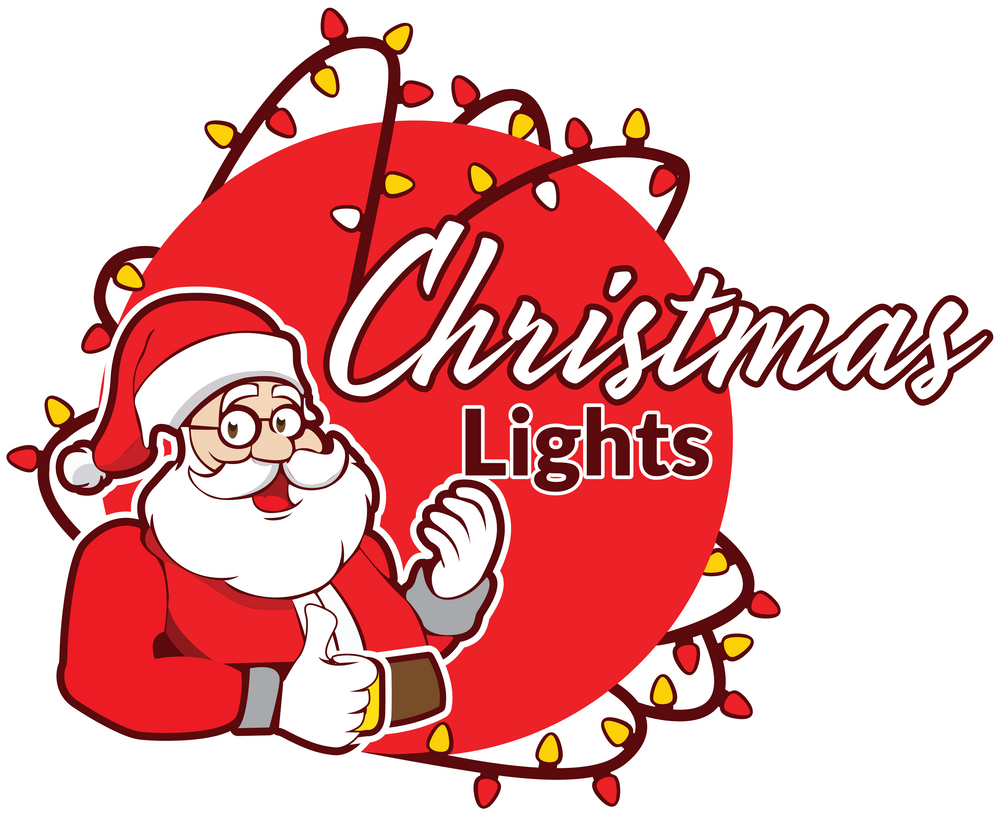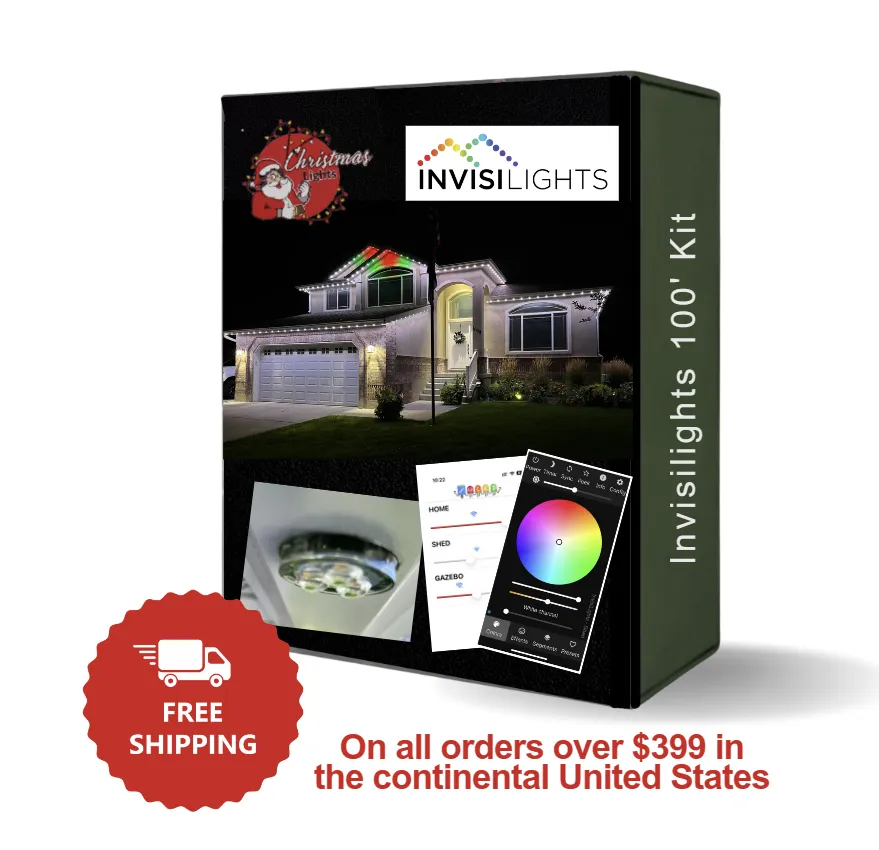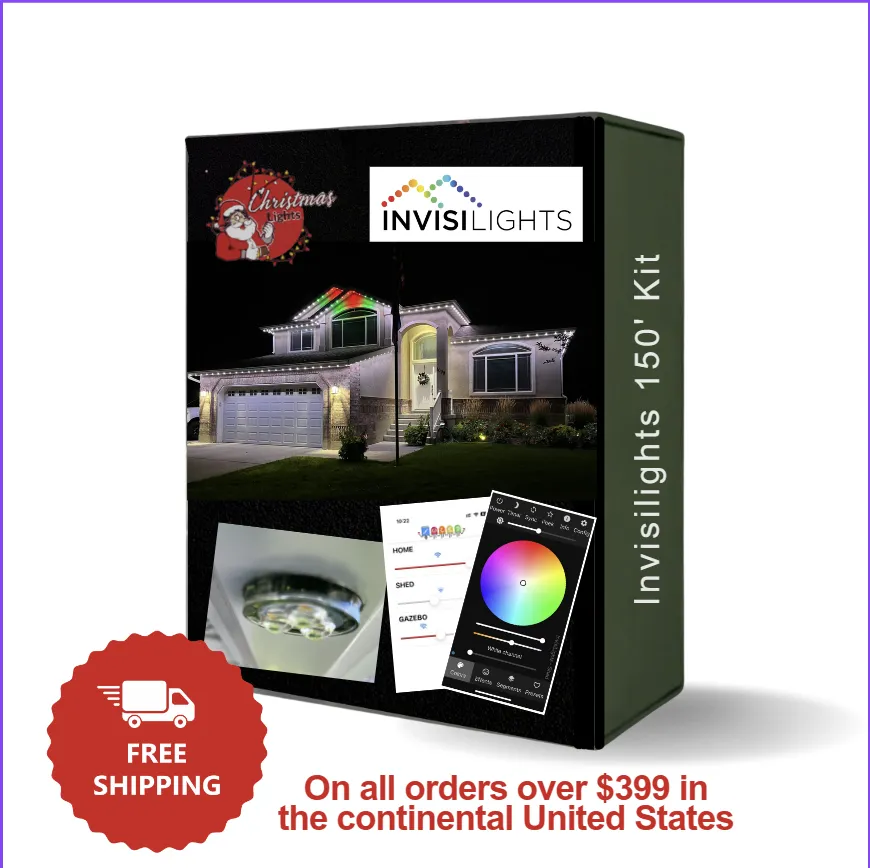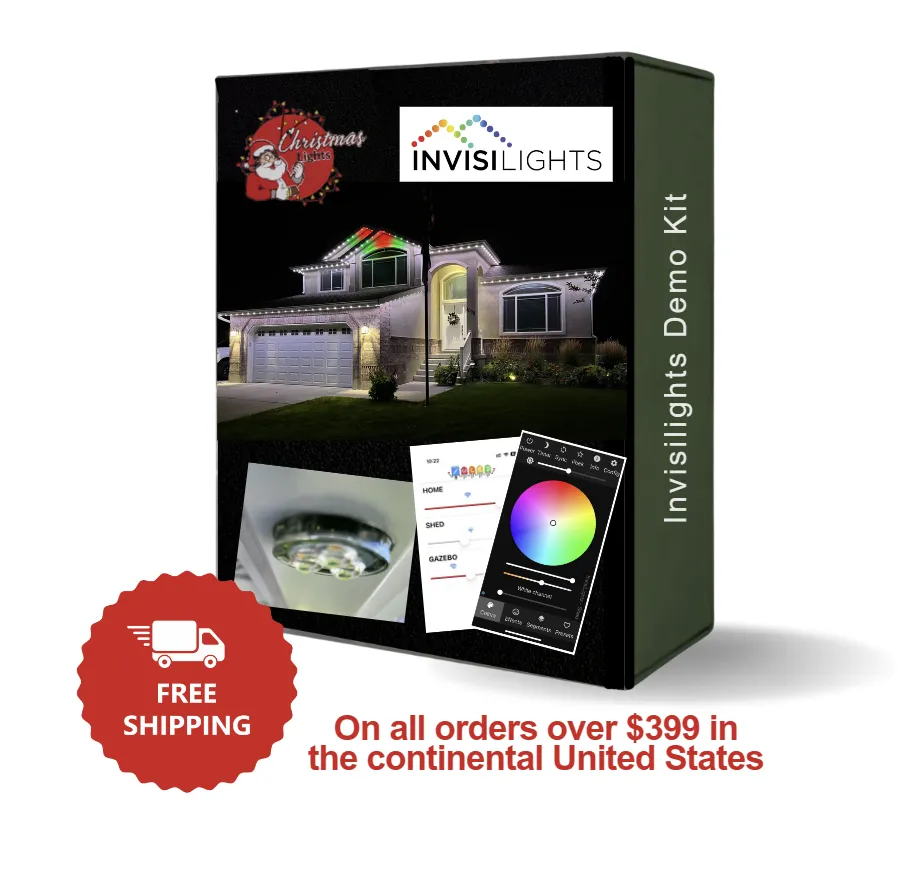Invisilights
Permanent Holiday Lighting
Customizable Lights for Any Event
WHAT YOU NEED TO KNOW BEFORE ORDERING
Total Linear footage of the installation.
This should include footage of lights and channel along with any Extensions or jumps you'll need to make
Where your controller box will be located
This is the most important step to planning out an installation, Without knowing where the controller will be you'll have no way to know the right materials to buy when it comes to extensions and accessories.
What Voltage system you want to use 24V or 36V
This is a decision you will make based on convince and efficiency, the most important factor with this will be the footage of each lighting run. If the total footage of a run is over 100' you'll need to either power inject on that run or switch to the 36V system that can go up to 200' before needing power injection.
Draw a Map
By mapping out the installation you'll be able to better understand and plan out the install giving you a better idea of what all you'll need to purchase to complete the job.
take the measurements from your map and add up the total number of materials you'll need.
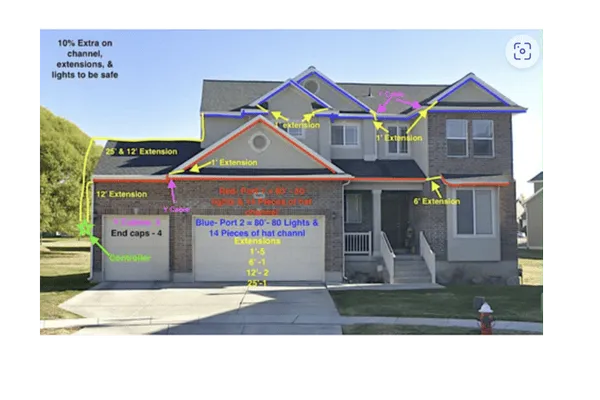
For the Map out example above the total material breakdown is:
System Voltage: 36V
Color of channel: Cameo
Channel Type: Hat
Total Lighted Footage: 160'
Power injection: NO
Controller: 1
Channel: 27- 6' sticks
Screws- 200
Lights: 175
1' extensions-7
6' Extensions-2
12' extensions-2
25- extensions- 1
Y Cables- 3
End caps- pack of 10
Absolute necessities
-Controller
-Lights
-Channel
-Screws
-Extension cables
Other Accessories
-Y Cable
-End Caps
- Signal boosters
-Power injection material
When would you need to power inject?
The controller will come with 3 outputs for your lighting runs, each 36V output can do a Max of 200', the 24V system can do a max of 100'. After that max you'll need to inject power. After you do so you can go an additional 100' with the 24V or 200' with the 36V system.
Power injection is needed due to voltage drop, voltage drop happens due to the length traveled away from the power source along with the gauge of the wire. due to the gauge of wire the lights and extensions run on it drops in voltage enough at 100' with the 24V system and 200' with the 36V system to effect the lights performance requiring a addition of power (Power Injection)
Materials needed for power injection 36V
Power injection pig female pig tale
Power injection Extension cables
Power injection T Cable.
Materials needed to Power inject 24V
16/2 - 12/2 Low voltage landscaping wire
Cut and Splice T cable
Water Proof Wire connectors
Discover the Transformative Power of Invisilights: Expertly Installed Permanent Lighting Solutions
Enhance your installation offerings with Invisilights, the premier permanent lighting solution designed for seamless integration into any property’s exterior architecture.
Crafted with high-quality aluminum channels and advanced LED technology, Invisilights delivers durability and superior energy efficiency—key selling points for your clients seeking long-lasting, cost-effective lighting solutions. Our system not only provides brilliant illumination but also boosts the aesthetic appeal and functionality of any home.
Offer your clients peace of mind with our robust 5-year warranty, ensuring reliable performance and minimal maintenance needs. This warranty supports your commitment to quality and customer satisfaction, making it easier for you to sell and install with confidence.
Our flexible, programmable system allows you to meet any client’s specific desires—from subtle accents to full-scale holiday displays—making it an adaptable choice for various applications. With Invisilights, you can cater to a wide range of preferences and needs, increasing your market reach and customer retention.
Choose Invisilights for your installations and add a transformative product to your portfolio that will impress clients and ensure your services remain in demand for years to come.
Frequently Asked Questions
What exactly comes in the 150' InvisiLights permanent outdoor lighting kit?
The InvisiLights kit is comprehensively equipped to ensure you have everything you need for installation. Each kit includes:
27 sticks of 6-foot Aluminum Channel to house and protect the lighting elements.
150 feet of dynamic RGBW LED Lights, which includes 23 sets of 6-count and 14 sets of 1-count lights, allowing for extensive coverage and diverse configuration options.
2 Data Boosters to enhance signal strength across the lighting installation, ensuring consistent control and color output.
A 320W Power Supply capable of supporting up to 190 puck lights, providing ample power for even the most extensive setups.
1 GFCI Outlet Adapter to ensure safe outdoor electrical connections.
1 Controller that allows you to manage and customize the lighting effects easily.
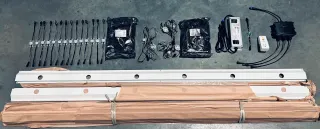
Will I need any additional components besides what's included in the Invisilights permanent lighting kit?
While the Invisilights kit comes with all the essential components for a standard installation, there are a couple of scenarios where you might need additional items:
Jumper Wires: Depending on the layout of your installation and the number of gaps or 'jumps' between the sections of lights, you may require jumper wires. These wires help bridge the gaps without losing the continuity of the light sequence, ensuring a smooth and uniform display across more complex architectures.
Data Boosters: If any section of your lighting setup is more than 15 feet away from the control box, additional data boosters will be necessary. Data boosters help maintain the integrity and brightness of the lights over longer distances, ensuring consistent performance throughout your installation.
Can I choose the color of the aluminum channel for my InvisiLights kit?
Yes, you can select your preferred color for the aluminum channel to match your home’s exterior or personal taste. Please make sure to specify your color choice in the notes at checkout when you place your order.
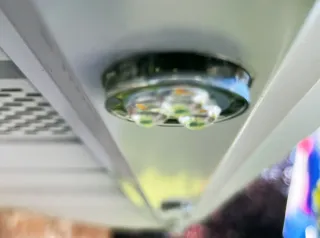
How do the included components of the InvisiLights kit enhance the lighting system?
Each component in the InvisiLights kit plays a crucial role in creating an effective and stunning lighting display:
Aluminum Channels: Provide a durable, weather-resistant housing for the LED lights, which helps in maintaining a clean and nearly invisible look during the day.
RGBW LED Lights: Offer vibrant, full-spectrum color and white light combinations, making it perfect for any occasion from festive holidays to elegant ambient lighting.
Data Boosters: Ensure that the signal remains strong across longer distances, which is crucial for larger installations.
Power Supply: Designed to efficiently handle the energy needs of the system without overload, ensuring safety and durability.
GFCI Outlet Adapter: Adds an extra layer of safety by protecting against electrical shorts and surges, particularly important in outdoor settings.
Controller: Provides the flexibility to customize and control the lighting sequences, colors, and patterns right from your smartphone or controller, adding convenience and advanced functionality to your lighting system.
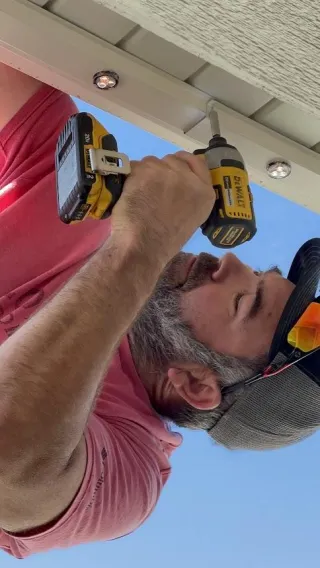
Can I use Invisilights year-round?
Absolutely! Invisilights are designed for versatile use throughout all seasons. Whether you're celebrating a special occasion, setting a mood for a party, Love your favorite sports team, or simply enhancing your home's ambiance, our lighting systems provide the perfect solution for any event, big or small.
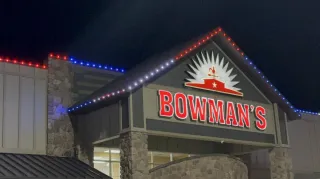
Can I set timers and events for Invisilights?
Yes, Invisilights feature advanced programmable settings that allow you to schedule lighting for specific events and automate timers. This functionality ensures that your lighting preferences are perfectly aligned with your lifestyle, turning on and off at predetermined times without any manual intervention.
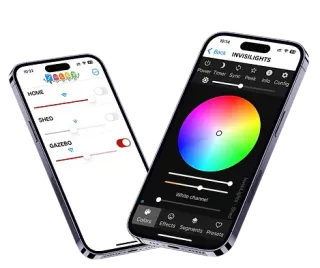
Is it possible to achieve warm or soft white with Invisilights?
Absolutely, Invisilights are equipped with RGBW technology, which includes a dedicated white LED alongside the standard red, green, and blue LEDs. This addition allows the system to produce authentic warm white, soft white, and various other shades of white with greater accuracy and intensity compared to traditional RGB systems. This capability ensures that you can effortlessly tailor the lighting to fit the desired ambiance and aesthetic of any environment, providing precise control over both vibrant colors and the subtlety of different white tones.
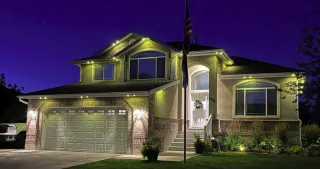
How do you ship your product?
Our products are shipped directly from our warehouse using reliable shipping carriers to ensure timely and safe delivery. Each product is securely packaged to prevent damage during transit, and we provide tracking information so you can follow your order’s journey to your doorstep.
Where are the controller and power supplies installed?
The controller and power supplies for Invisilights are typically installed in an accessible location such as a garage or utility room. These components connect to your home’s WiFi network, allowing seamless control over the lighting system via our user-friendly mobile app.
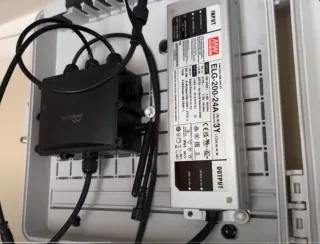
How long do Invisilights last?
Invisilights are engineered to last, with each LED bulb boasting a lifespan of over 50,000 hours. Given a typical usage of 10 hours per night, this translates to approximately 5,000 nights. This means your Invisilights could illuminate your home's exterior for nearly 14 years under these conditions, ensuring that your investment not only adds beauty but also long-term value to your property.
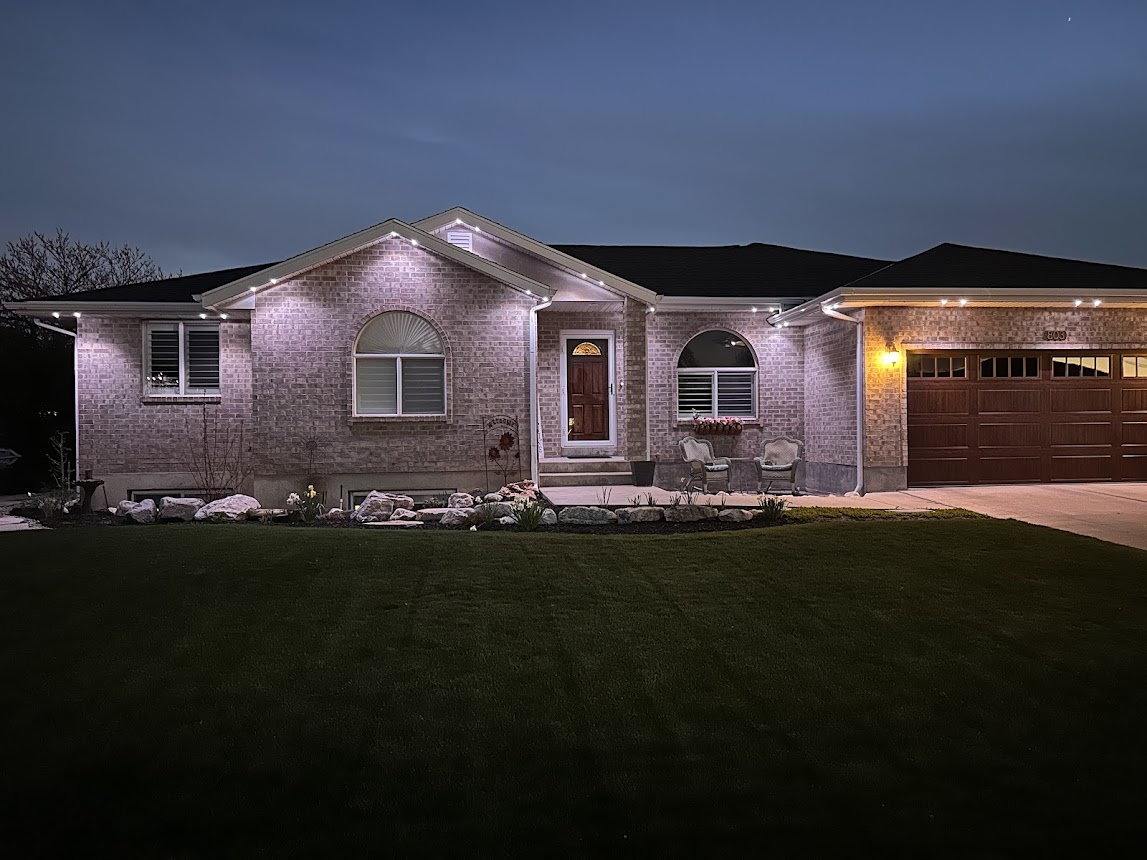
Are Invisilights dimmable?
Yes, all Invisilights are fully dimmable. This feature allows you to adjust the intensity of the light to suit various occasions, from a soft glow for a romantic evening to bright, vibrant colors for a festive celebration.

What types of custom channels are available?
Invisilights offers two types of custom channels, available in 40 different colors, ensuring a nearly invisible installation. These channels are designed to blend seamlessly with your home’s architecture, providing discreet yet effective lighting.

Can I control different zones independently?
Yes, the Invisilights system supports multiple zones which can be controlled independently or synchronized. This functionality allows for intricate lighting designs that can vary across different areas of your home, enhancing the overall impact and utility of your installation.
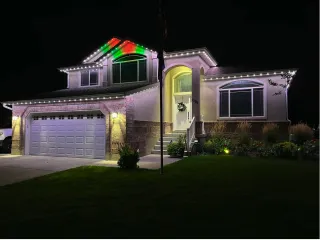
What is outdoor permanent lighting?
Permanent lighting refers to architectural-grade lighting systems that are installed permanently on your property to provide year-round illumination.
How does permanent lighting differ from traditional holiday lighting?
Unlike traditional holiday lighting, which is typically temporary and used only during specific seasons, permanent lighting is installed once and can be used throughout the year for various occasions
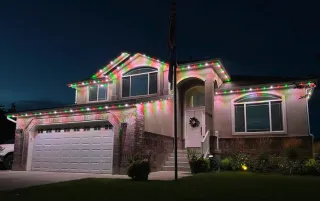
Discover Expert Tips on Our Blog
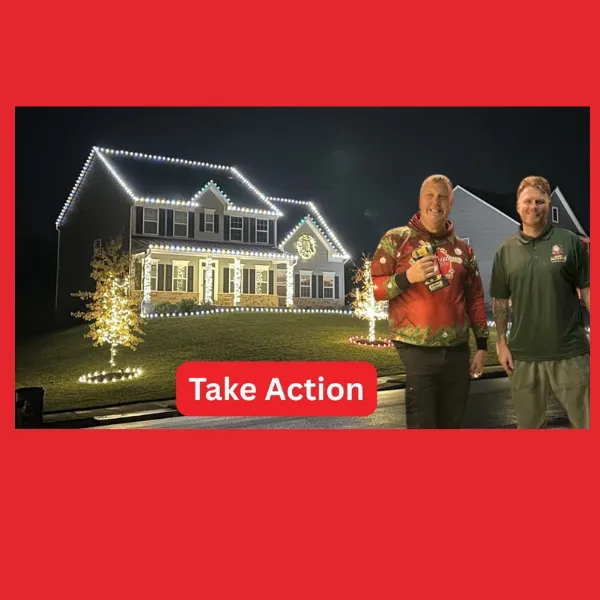
$100K Christmas Light Secret: Doers Win, Learners Fail
The Christmas lighting industry presents incredible opportunities for entrepreneurs willing to move beyond learning and into action. While many business owners get stuck in endless research phases, the most successful operators understand that knowledge without implementation yields no results. This principle becomes especially critical in a seasonal business where timing and execution determine annual revenue.
The difference between those who achieve six-figure seasonal businesses and those who struggle isn't access to information—it's the willingness to take consistent, decisive action even when feeling unprepared. Success stories in this industry consistently feature individuals who started with limited experience but compensated through relentless execution and systematic improvement.
The Foundation: Mastering Installation Competency
Before scaling any Christmas lighting business, establishing personal competency in installations becomes essential. This doesn't mean performing every job personally forever, but understanding each aspect of the installation process enables effective training and quality control systems.
Successful business owners often describe the first season as intensive learning where they personally handle installations while simultaneously building customer relationships and refining operational processes. This hands-on approach creates the foundation for systematic expansion in subsequent years.
The installation phase encompasses numerous moving parts: proper equipment usage, safety protocols, aesthetic design principles, and customer communication throughout the process. Mastering these basics allows business owners to develop training materials and quality standards for future crew members.
Building Systems for Scalability
Year one typically involves the owner on every job, learning systems and establishing customer relationships. Year two often marks the transition where successful operators step back from daily installations to focus on business development, sales, and crew management. This progression requires deliberate system development rather than hoping procedures will naturally emerge.
Creating documented processes for common scenarios—single-story homes, two-story installations, commercial properties—accelerates training and maintains consistency across different crew members. These systems become especially valuable when seasonal hiring requires rapidly bringing new team members up to speed.
Overcoming Analysis Paralysis
One of the most significant barriers to Christmas lighting business success is overthinking, particularly around pricing strategies. Many operators become trapped in endless loops of questioning whether their market will support premium pricing, often seeking validation for charging less rather than focusing on value delivery.
This hesitation typically stems from fear rather than market reality. Successful businesses charge $8-12 per foot from the beginning, understanding that premium pricing enables sustainable operations while lower pricing creates a cycle of financial stress and poor service delivery.
The Pricing Mindset Shift
The energy and confidence you project during sales conversations directly impacts customer perception and willingness to pay premium prices. When business owners doubt their pricing internally, this uncertainty transmits to potential customers, making price objections more likely.
Conversely, operators who internalize their value proposition and feel confident in their pricing rarely encounter significant price resistance. They focus conversations on emotional benefits and customer outcomes rather than technical specifications or cost justifications.
Strategic Marketing for Lead Generation
Successful Christmas lighting businesses employ systematic approaches to lead generation rather than relying on single marketing channels. Testing multiple approaches—yard signs, Facebook advertising, door hangers, cold calling—provides data to optimize marketing investments.
The testing process involves running small-scale experiments across different channels, measuring results, and scaling successful approaches while discontinuing ineffective methods. This data-driven approach prevents large financial losses on unproven marketing strategies.

Yard Sign Strategy
Yard signs remain one of the most effective lead generation tools when executed properly. The key lies in simplicity and strategic placement rather than complex designs or excessive information. Effective signs contain only business name, "Christmas Lights," and a large, readable phone number.
Planning for 200-300 signs throughout October and November generates significant visibility, though some successful operators achieve substantial results with much smaller numbers through strategic placement in high-traffic areas.
Digital Marketing Integration
Facebook advertising works particularly well for Christmas lighting services because it allows precise geographic and demographic targeting. The key to successful Facebook campaigns lies in focusing on emotional benefits rather than technical features, creating ads that resonate with customers' desires for holiday magic and family memories.
Combining digital marketing with traditional methods like yard signs creates multiple touchpoints that reinforce brand awareness and generate leads from different customer segments.
Staffing Solutions and Team Building
Finding reliable seasonal help presents ongoing challenges for Christmas lighting businesses. Successful operators often recruit from related industries, particularly roofing, where workers possess relevant skills and experience seasonal slowdowns that align with Christmas lighting demand.
Roofers typically demonstrate strong work ethics, comfort working at heights, good safety judgment, and familiarity with ladder usage and roof navigation. Additionally, roofers often know each other, creating opportunities to build teams through referrals from successful initial hires.
Early Recruitment Strategies
Beginning recruitment efforts early in the year, rather than waiting until October, provides access to better candidates and time for proper training. This proactive approach prevents the common problem of scrambling for help during peak season when demand is highest.
Building relationships with roofing contractors and other seasonal workers throughout the year creates a pipeline of potential employees who understand your business needs and quality standards before the busy season begins.
Customer Retention and Business Growth
Customer retention rates in the Christmas lighting industry typically range from 80-90%, creating significant business value beyond the initial sale. This high retention rate means first-year customer acquisition efforts compound over time, making subsequent years progressively more profitable.
Successful operators implement systematic follow-up processes to maximize retention rates. This includes regular communication during the off-season, early booking incentives, and maintaining detailed customer records to ensure consistent service delivery.
The Compounding Effect
Year one focuses on learning systems and building initial customer base. Year two benefits from returning customers plus new acquisitions. Year three builds on two years of returning customers, making higher revenue targets increasingly achievable without proportional increases in marketing investment.
This compounding effect explains why many Christmas lighting businesses achieve dramatic revenue growth in years two and three despite maintaining similar operational capacity.
Scaling Beyond Personal Limits
The transition from owner-operator to business manager represents a critical growth phase requiring different skills and systems. Moving from personally handling every installation to managing crews and focusing on sales and business development demands systematic approach.
Successful scaling requires implementing quality control systems, developing training programs, and creating accountability measures to ensure service standards remain consistent as the business grows beyond direct owner involvement.
Revenue Progression Patterns
Many successful operators follow predictable revenue progression patterns: $100,000-200,000 in year one, $300,000-500,000 in year two, and $500,000-1,000,000+ in subsequent years. These increases typically result from improved systems, better pricing strategies, and expanded capacity rather than simply working more hours.
The most significant operational challenges often occur during the transition from $500,000 to $1,000,000 annual revenue, requiring additional crew members, administrative support, and more sophisticated business systems.
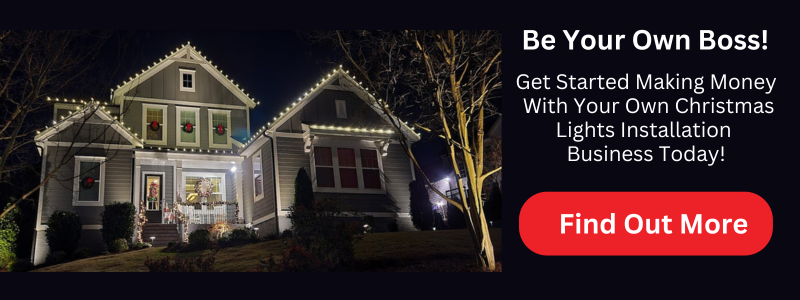
Avoiding Common Expansion Mistakes
Premature expansion into new geographic markets often dilutes focus and resources before maximizing potential in the initial market. Most successful operators reach $800,000-1,000,000 in annual revenue in their primary market before considering expansion.
The principle of "what you water grows" emphasizes the importance of focusing energy and resources on developing one market thoroughly rather than spreading efforts across multiple locations. This focused approach typically yields better results and stronger business foundations.
Market Maximization Strategies
Before expanding geographically, successful businesses maximize their current market through improved close rates, higher average tickets, expanded service offerings, and increased customer retention. These improvements often reveal significant untapped potential in existing markets.
Testing marketing channels systematically—increasing yard sign quantities, expanding Facebook ad spend, implementing referral programs—helps identify the optimal marketing mix for each specific market area.
Professional Development and Continuous Learning
The most successful Christmas lighting entrepreneurs invest heavily in their own development through training programs, coaching relationships, and industry education. This investment accelerates learning curves and helps avoid costly mistakes that slow business growth.
Regular skills development in sales techniques, business systems, and operational efficiency creates competitive advantages that compound over time. Recording sales conversations for self-analysis, attending industry training, and working with business coaches represent common investments among high-performing operators.
Networking and Relationship Building
Building relationships within the industry and local business community opens opportunities that extend beyond direct marketing efforts. Participation in business associations, charity events, and industry groups creates referral sources and strategic partnerships.
These relationships often prove more valuable than traditional advertising, particularly for high-value commercial accounts and affluent residential customers who make decisions based on trust and recommendations rather than price comparisons.

Q1: How long does it take to become competent at Christmas light installations?
A: Most business owners can achieve basic competency within 2-4 weeks of focused practice, but mastering efficient installation techniques typically takes a full season. The key is starting with simpler installations and gradually tackling more complex projects while developing systematic approaches to common scenarios.
Q2: What's the biggest mistake new Christmas lighting businesses make?
A: Underpricing services is the most common and damaging mistake. Many new operators charge $5-6 per foot thinking it will help them compete, but this pricing makes it impossible to build a sustainable business with proper insurance, equipment, and quality service delivery.
Q3: How do I overcome the "let me talk to my spouse" objection?
A: Ask clarifying questions like "Who's the decision maker here?" and "What specifically do you need to discuss?" This often reveals the real objection, which might be budget concerns or uncertainty about the value proposition rather than needing spousal approval.
Q4: When should I start recruiting seasonal employees?
A: Begin recruiting in January through March for the following season. This gives you access to better candidates and time for proper training. Waiting until October leaves you competing for workers when everyone else is hiring.
Q5: How do I know if I've maximized my current market?
A: You've likely maximized when increasing marketing spend in existing channels produces diminishing returns. For example, if doubling your yard signs from 100 to 200 doesn't increase leads proportionally, you may need to explore different marketing channels or expand geographically.

Q6: Should I offer contracts to guarantee customer retention?
A: Most successful operators use loyalty programs with incentives rather than contracts. Offering 10% discounts for early booking and guaranteed pricing for multiple years often achieves similar retention rates without the legal complications of contracts.
Q7: How important is it to have a professional trailer and equipment?
A: Professional appearance significantly impacts customer perception and pricing power. Investing in wrapped trailers, quality uniforms, and professional equipment helps justify premium pricing and creates marketing value through increased visibility.
Q8: What's the typical customer retention rate in this industry?
A: Well-run Christmas lighting businesses typically achieve 80-90% customer retention rates. This high retention makes the business increasingly profitable over time as new customer acquisition builds on an expanding base of returning customers.
Q9: How do I handle price objections from potential customers?
A: Focus the conversation on value and emotions rather than price. Ask about their motivations for wanting Christmas lights, emphasize the memories they'll create, and avoid detailed discussions of pricing unless specifically asked. Confidence in your value proposition reduces price objections.
Q10: When is it too late to start a Christmas lighting business for the current season?
A: It's rarely too late if you're willing to take immediate action. Some operators have started in late October and still achieved significant first-year revenue by focusing intensively on door-to-door sales and rapid execution. However, earlier starts provide more time for marketing and systematic customer acquisition.
Copyright ©2025 All Right Reserved website designed by christmaslights.io
Terms of Service / Privacy Policy
Have questions or need assistance?
Contact us at (855)619-LITE
